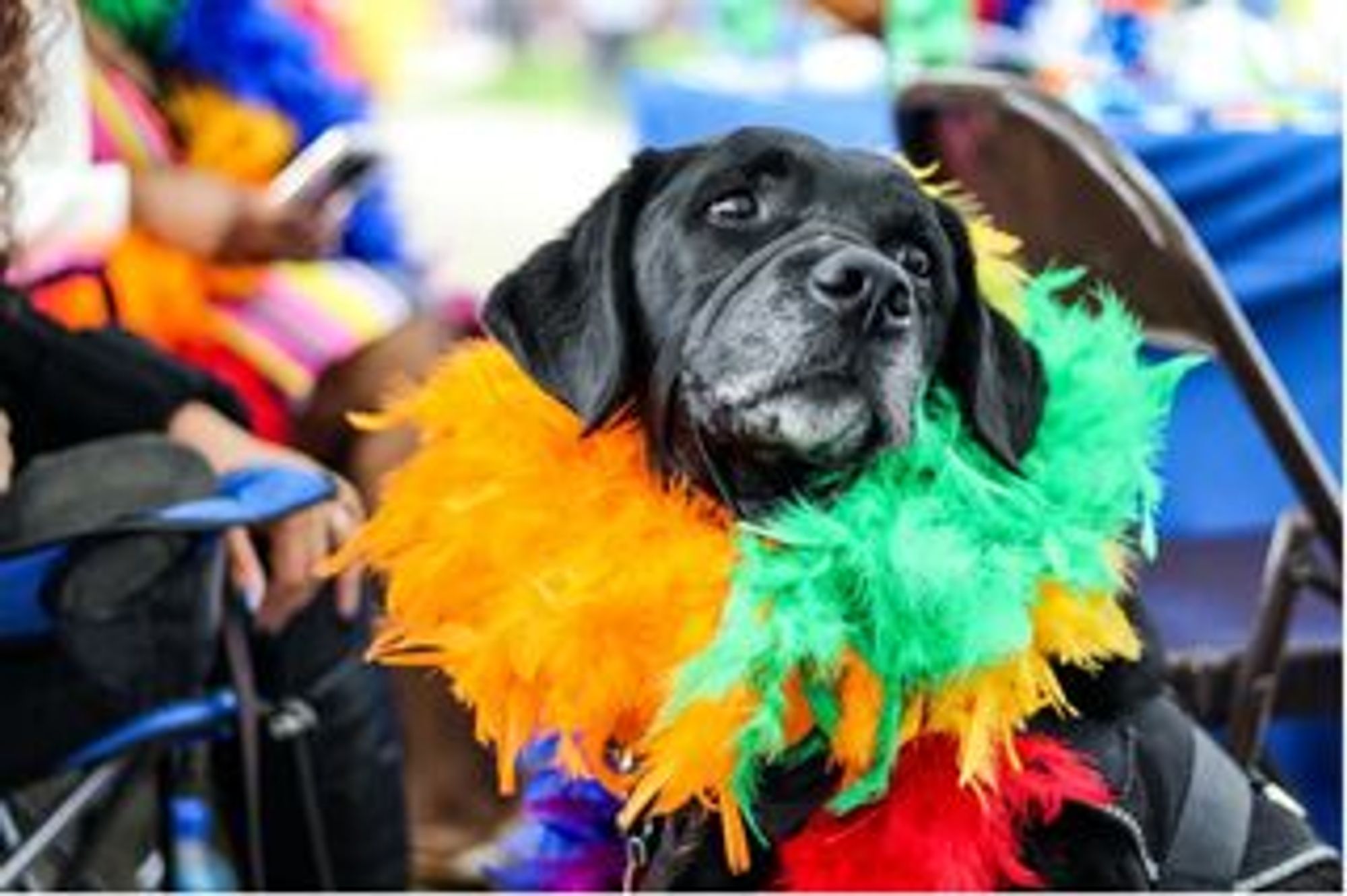KEY POINTS
- Pet ownership increased in the U.S. during the pandemic, potentially because people were looking for ways to cope with isolation and loneliness.
- LGBTQ+ individuals often experience minority stress or additional daily stressors associated with having a stigmatized identity.
- The unconditional, non-judgmental social support and companionship offered by animals make pet ownership particularly rewarding for LGBTQ+ folk.
This post was co-authored with Kerri Mozessohn, a student at Trent University.
Fezco, a 5-year-old dog, recently made international headlines when his previous owner abandoned him at a pet shelter for purportedly "being gay" (aka, the dog had mounted another male dog). Lucky for Fezco, though, his story had a happy ending when he was adopted by his now "new" family, a gay male couple living just outside of Charlotte, North Carolina. Fezco's story has warmed many hearts, especially within the LGBTQ+ community. While some are certainly drawn to the story out of empathy due to shared experiences of familial rejection after coming out, others may be drawn in by knowing personally how much a pet companion can shape one's life, often for the better.
Just over 70 percent of U.S. households reported having a pet companion in 2021, a percentage that increased approximately 3 percent during the pandemic. While some may have adopted a pet during the pandemic because they felt they finally had enough time at home to properly train a puppy, many others may have turned to pets as a source of relief from the now-familiar experiences of lockdowns and their associated isolation and loneliness. Anecdotally, LGBTQ+ people are often considered pet lovers, but until recently, little research had specifically examined how pet companionship may fulfill unique needs within the LGBTQ+ population.
While the COVID-19 pandemic has made experiences of isolation and loneliness common for many, such experiences were already heightened within the LGBTQ+ community prior to the pandemic. Often termed minority stress, LGBTQ+ individuals cope with an "additional" layer of daily stressors associated with having to manage their stigmatized identity in a world that still widely privileges heterosexuality and cisnormativity. Turning to pets as a source of judgment-free social support has, therefore, been a longstanding practice among many within the LGBTQ+ community.
Dubbed the "pet effect," just being in the presence of a companion animal can enhance an individual's well-being. But the support offered by pet companionship goes much further than simply being a "happy presence" in a human's life. To better understand the role of pets as a source of social support, specifically for LGBTQ+ individuals, Schmitz and colleagues recently published an article in the Archives of Sexual Behaviour in which they report their findings from a qualitative study.
Creating safe spaces and enhancing mental health
Schmitz and colleagues asked participants to describe how they felt their pet had influenced their mental health or helped them to cope with stressful life experiences. Participants described relying on their pets as critical sources of support that helped to enhance their feelings of resilience when coping with heightened levels of stress. The perceptions of pure and unconditional love offered by pets can often be a stark contrast to navigating a world of stigma and prejudice, and therefore pet companionship for LGBTQ+ individuals may be particularly appealing and beneficial.
One of the nonbinary participants in the study described their daily experiences of being misgendered by others and the toll that this takes on their mental health. Yet, even on a day where perhaps no other human got their name or pronouns right, they described the joy and comfort of coming home to a pet that can never misgender them. The ability of animals to accept people for who they are regardless of their flaws, identities, or opinions elevates pet companionship to a level of acceptance that is sadly often challenging to find among our fellow humans.
We saved each other
According to Schmitz and colleagues, pet companionship can help LGBTQ+ individuals to navigate the complex social dynamics surrounding their marginalized identities. Animals are excellent at empathizing with their human companions, as they are able to give their people undivided attention without filtering the relationship through existing stigma or emotional baggage. One participant in the study noted that pets have relatively small worlds compared to their humans, which makes their humans their everything. The participant went on to explain how she perceives her pet as existing just to want and give love. Consequently, pets become a wonderful source of unconditional love around whom socially marginalized people can bring their "full selves."
Pets may have been particularly important companions to LGBTQ+ individuals (and others) throughout the COVID-19 pandemic and its associated lockdowns and periods of isolation. Pets can provide an adaptive and grounding form of coping to their LGBTQ+ companions, helping them to cope with not just daily stressors but also more challenging mental health issues, including depression and anxiety.
Pets encourage positive coping
The relationship with a pet continues irrespective of what else may be going on in a human's life or the world around them. Another participant in the study noted how pets could easily take you away from your own problems, providing enough of an escape to keep a human going through challenging times. For example, dog owners often experience upticks in their daily exercise routine simply by caring for their canine companion.
All of the little tasks associated with caring for an animal companion can help ground humans in the daily activities of living. Although such tasks may seem simple, they can often be a struggle for those coping with depression or anxiety. Thus, the reciprocal nature of human-animal companionship can provide the routine and motivation needed for many to keep on with the daily tasks of living. Indeed, when pets help their humans to pull through challenging times, the lingering impression is often that the pet saved their human's life.
"When it felt like everything else was falling apart in my world, I had these two fuzzy little beings who loved me." (Schmitz et al., 2021)
Obviously, the joy of coming home to a pet waiting excitedly to see you at the door is not unique to LGBTQ+ individuals; pet companionship is popular across sexual and gender identities. Nonetheless, LGBTQ+ individuals may be particularly well-positioned to benefit from the companionship of a pet who can allow them to access a unique source of unconditional social support that is truly free of any form of societal stigma or prejudice. Consequently, animal companionship can help LGBTQ+ individuals to cope with whatever stressors they may be experiencing in their lives and to develop healthy, positive, and adaptive coping mechanisms through the process of reciprocal caring. While everyone is deserving of unconditional support and love, we unfortunately still live in a world in which such sentiments are often withheld from those within the LGBTQ+ community.
References
American Pet Products Association. (2022). 2021-2022 APPA national pet owners survey statistics: Pet ownership and annual expenses. http://www.americanpetproducts.org/press_industrytrends.asp
Community Marketing & Insights. (2021). 15th Annual LGBTQ community survey. https://www.communitymarketinginc.com/documents/temp/CMI-13th_LGBTQ_Com…
Janssens, M., Eshuis, J., Peeters, S., Lataster, J., Reijnders, J., Enders-Slegers, M.-J., & Jacobs, N. (2020). The pet-effect in daily Life: An experience sampling study on emotional wellbeing in pet owners. Anthrozoös, 33(4), 579–588. https://doi.org/10.1080/08927936.2020.1771061
Meyer, I.H. (2003). Prejudice, social stress, and mental health in lesbian, gay, and bisexual populations: Conceptual issues and research evidence. Psychological Bulletin, 129(5), 674–697. https://doi.org/10.1037/0033-2909.129.5.674
Schmitz, R. M., Tabler, J., Carlisle, Z. T., & Almy, L. (2021). LGBTQ+ people’s mental health and pets: Novel strategies of coping and resilience. Archives of Sexual Behavior, 50(7), 3065–3077. https://doi.org/10.1007/s10508-021-02105-6


